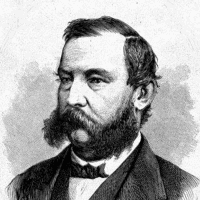Anson Burlingame
| Anson Burlingame | |
|---|---|
 |
|
| Member of the U.S. House of Representatives from Massachusetts's 5th district |
|
|
In office March 4, 1855 – March 3, 1861 |
|
| Preceded by | William Appleton |
| Succeeded by | William Appleton |
| Personal details | |
| Born |
November 14, 1820 New Berlin, Chenango County, New York, U.S. |
| Died | February 23, 1870 (aged 49) Saint Petersburg, Russia |
| Political party | American, Republican |
| Alma mater | University of Michigan, and Harvard Law School |
| Signature | |
Anson Burlingame (November 14, 1820 – February 23, 1870) was an American lawyer, legislator, and diplomat.
Burlingame was born in New Berlin, Chenango County, New York. In 1823 his parents (Joel Burlingame and Freelove Angell) took him to Ohio, and about ten years afterwards to Michigan. Between 1838 and 1841 he studied at the Detroit branch of the University of Michigan, and in 1846 graduated from Harvard Law School. On June 3, 1847 he married Jane Cornelia Livermore. They had sons Edward Livermore Burlingame (born 1848) and Walter Angell Burlingame (born 1852), as well as a daughter Gertrude Burlingame (born 1856).
Burlingame practised law in Boston, Massachusetts, and won a wide reputation by his speeches for the Free Soil Party in 1848. He was a member of the Massachusetts constitutional convention in 1853, of the state senate from 1853 to 1854, and of the United States House of Representatives from 1855 to 1861, being elected for the first term as a Know Nothing and afterwards as a member of the new Republican Party, which he helped to organize in Massachusetts. He is a brother of the Delta Kappa Epsilon fraternity (Sigma chapter).
In May 1856, Senator Charles Sumner of Massachusetts delivered a vituperative denunciation of President Franklin Pierce and Southerners who sympathized with the pro-slavery violence in Bleeding Kansas. In particular, Sumner lambasted Senator Andrew Butler, a cousin of Congressman Preston Brooks of South Carolina. Three days later, Congressman Brooks advanced upon Sumner while he worked at his desk in the Senate chamber. Using his cane, Brooks beat Sumner into unconsciousness, with Sumner ripping his bolted-down desk from the floor as he attempted to escape. Brooks received no official censure from the House of Representatives, and was instead hailed as a hero in much of the pro-slavery South.
...
Wikipedia
